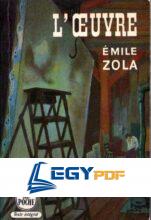| المؤلِّف | |
| الناشر | Gallimard |
| الصفحات | 191 صفحة |
| التصنيف | le plus populaire |
| تحميل الكتاب | |
L’Étranger: A Timeless Classic by Albert Camus (PDF)
L’Étranger, written by the renowned French author Albert Camus, is a masterpiece of modern French literature. This thought-provoking novel, which is available exclusively to EGYPDF visitors, has captivated readers for decades with its unique narrative style and profound philosophical themes. In this essay, we will explore the captivating story of L’Étranger, delve into its central themes, highlight some quotes from the book, and provide reviews from readers who have been moved by Camus’ work.

About the Author:
Albert Camus, a French philosopher, author, and Nobel Prize laureate, is widely regarded as one of the most influential existentialist writers of the 20th century. Apart from L’Étranger, Camus has written other notable works such as La Peste (The Plague), La Chute (The Fall), and Le Mythe de Sisyphe (The Myth of Sisyphus), all of which explore the human condition and the absurdity of existence.
Plot Summary:
L’Étranger tells the story of Meursault, a detached and emotionally distant protagonist who lives in Algiers, a French colony in North Africa. The novel begins with the death of Meursault’s mother, and his seemingly indifferent reaction to her passing sets the tone for the rest of the story. As Meursault goes about his daily life, he becomes entangled in a series of events that ultimately lead to him committing a senseless act of violence on a hot Algerian beach. The novel then follows Meursault’s subsequent trial and his reflections on the absurdity of life and the inevitability of death.
Themes Explored:
L’Étranger delves into several deep philosophical themes that continue to resonate with readers today. Some of the key themes explored in the book include:
Existentialism: Camus was a prominent figure in the existentialist movement, and L’Étranger reflects many of the central tenets of this philosophy. The novel explores the idea of the absurdity of life, the concept of freedom, and the individual’s search for meaning in an indifferent world.
Absurdity of Existence: Camus argues that life is inherently absurd, and human existence is characterized by the lack of inherent meaning or purpose. Meursault’s detached and indifferent demeanor throughout the novel exemplifies this existential absurdity, as he grapples with the meaninglessness of his actions and the world around him.
Conformity vs. Non-conformity: Meursault’s refusal to conform to societal norms and expectations is a central theme in the novel. His inability to conform to social conventions and express the expected emotions after his mother’s death and his subsequent violent act challenges societal expectations of conformity and raises questions about the consequences of non-conformity.
The Nature of Truth: L’Étranger also explores the elusive nature of truth and the subjectivity of perception. Meursault’s narration of events and his perception of reality are called into question during his trial, highlighting the fluidity and ambiguity of truth.
Quotes from the Book:
L’Étranger is filled with memorable quotes that capture the essence of Camus’ philosophical ideas. Some notable quotes from the book include:
« I had been right, I was still right, I was always right. I had lived my life one way and I could just as well have lived it another. I had done this and I hadn’t done that. I hadn’t done this thing but I had done another. And so? » This quote reflects Meursault’s realization of the arbitrary nature of life and the choices we make, suggesting
dont le caractère absurde de la vie et la recherche de sens dans un monde indifférent. Des citations mémorables du livre reflètent la réalisation de Meursault de la nature arbitraire de la vie et des choix.
Sous-titre 1 : L’existentialisme dans L’Étranger
L’Étranger est considéré comme un exemple classique de littérature existentialiste. Le roman reflète la philosophie existentialiste de Camus, qui met l’accent sur l’absurdité de l’existence humaine et la recherche de sens de l’individu dans un monde apparemment dépourvu de sens. Le comportement détaché et indifférent de Meursault envers les normes sociales met en lumière les thèmes existentialistes de l’absurdité de la vie et du concept de liberté. Le roman soulève également des questions sur les conséquences de la non-conformité et les attentes de conformité de la société.
Sous-titre 2 : L’absurdité de l’existence dans L’Étranger
Le thème de l’absurdité de l’existence est au cœur de L’Étranger. Camus affirme que la vie est intrinsèquement absurde, et les actions et attitudes de Meursault tout au long du roman illustrent cette idée. L’absence de réaction émotionnelle de Meursault à la mort de sa mère et son acte de violence insensé sur la plage soulignent le caractère dépourvu de sens et imprévisible de la vie. Le roman dépeint l’absurdité de l’existence humaine, où les actions et les événements peuvent ne pas avoir de signification ou de but intrinsèque.
Sous-titre 3 : Conformité vs Non-conformité dans L’Étranger
L’Étranger explore également le thème de la conformité par rapport à la non-conformité. Le refus de Meursault de se conformer aux normes sociales et d’exprimer les émotions attendues après la mort de sa mère remet en question les attentes de conformité de la société. Il ne se conforme pas aux conventions et attentes sociales, ce qui le conduit à l’aliénation et à son procès ultérieur. Le roman soulève des questions sur les conséquences de la non-conformité et la tension entre les normes sociales et la liberté individuelle.
Sous-titre 4 : La nature de la vérité dans L’Étranger
Le roman aborde également
Lire aussi sur Une Fille comme Elle




